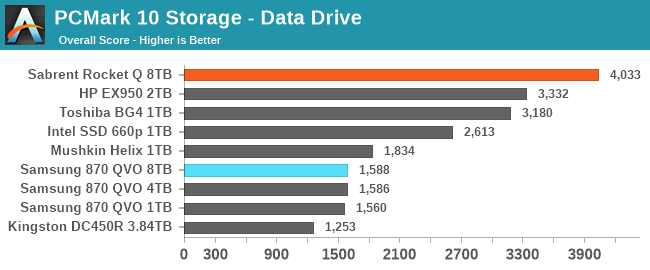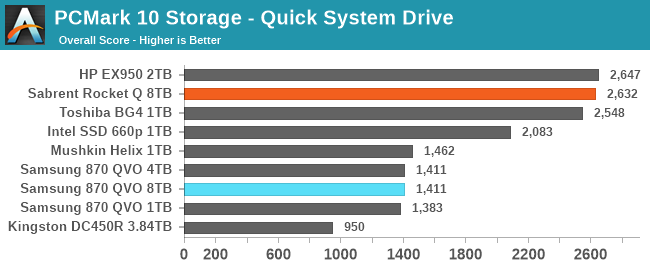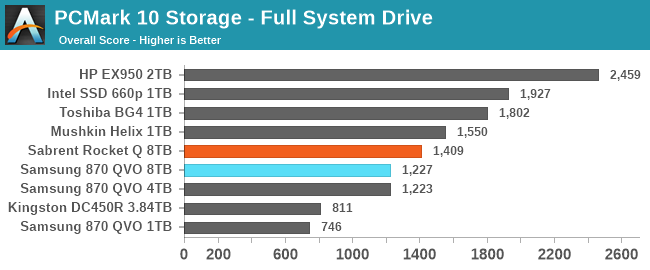QLC Goes To 8TB: Samsung 870 QVO and Sabrent Rocket Q 8TB SSDs Reviewed
by Billy Tallis on December 4, 2020 8:00 AM ESTPCMark 10 Storage Benchmarks
At the end of 2019, UL released a major update to their popular PCMark 10 benchmark suite, adding storage performance tests that had been conspicuously absent for over two years. These new storage benchmarks are similar to our AnandTech Storage Bench (ATSB) tests in that they are composed of traces of real-world IO patterns that are replayed onto the drive under test. We're incorporating these into our new SSD test suite, and including our first batch of results here.
PCMark 10 provides four different storage benchmarks. The Full System Drive, Quick System Drive and Data Drive benchmarks cover similar territory to our ATSB Heavy and Light tests, and all three together take about as long to run as the ATSB Heavy and Light tests combined. The Drive Performance Consistency Test is clearly meant to one-up The Destroyer and also measure the worst-case performance of a drive that is completely full. Due to time constraints, we are not yet attempting to add the Drive Performance Consistency Test to our usual test suite.
| PCMark 10 Storage Tests | ||
| Test Name | Data Written | |
| Data Drive | 15 GB | |
| Quick System Drive | 23 GB | |
| Full System Drive | 204 GB | |
| Drive Performance Consistency | 23 TB + 3x drive capacity | |
The primary subscores for the PCMark 10 Storage benchmarks are average bandwidth and average latency for read and write IOs. These are combined into an overall score by computing the geometric mean of the bandwidth score and the reciprocal of the latency score. PCMark 10 also records more detailed statistics, but we'll dig into those in a later review. These PCMark 10 Storage test runs were conducted on our Coffee Lake testbed:
| AnandTech Coffee Lake SSD Testbed | |
| CPU | Intel Core i7-8700K |
| Motherboard | Gigabyte Aorus H370 Gaming 3 WiFi |
| Chipset | Intel H370 |
| Memory | 2x 8GB Kingston DDR4-2666 |
| Case | In Win C583 |
| Power Supply | Cooler Master G550M |
| OS | Windows 10 64-bit, version 2004 |
Data Drive Benchmark
The Data Drive Benchmark is intended to represent usage a secondary or portable drive may be subject to. This test simulates copying around files, but does not simulate the IO associated with launching and running applications from a drive.
 |
|||||||||
| Overall Score | Average Bandwidth | Average Latency | |||||||
Starting off, the 8TB Sabrent Rocket Q leads the field thanks to its massive and fast SLC cache; it clearly outperforms even the decently high-end 2TB TLC-based HP EX920. The several capacities of the Samsung 870 QVO all performa about the same: less than half the speed of the faster NVMe drives, and slower than the slowest entry-level NVMe drives. The enterprise SATA drive with no SLC caching comes in last place.
Quick System Drive Benchmark
The Quick System Drive Benchmark is a subset of the Full System Drive Benchmark, running only 6 out of the 23 sub-tests from the Full test.
 |
|||||||||
| Overall Score | Average Bandwidth | Average Latency | |||||||
Moving on to the Quick test, the Sabrent Rocket Q no longer stands out ahead of the other NVMe drives, but still offers decent performance. The performance gap between the NVMe drives and the Samsung 870 QVO drives has narrowed slightly, but is still almost a factor of two.
Full System Drive Benchmark
The Full System Drive Benchmark covers a broad range of everyday tasks: booting Windows and starting applications and games, using Office and Adobe applications, and file management. The "Full" in the name does not mean that each drive is filled or that the entire capacity of the drive is tested. Rather, it only indicates that all of the PCMark 10 Storage sub-tests are included in this test.
 |
|||||||||
| Overall Score | Average Bandwidth | Average Latency | |||||||
The Full test starts to bring the downsides of QLC NAND into focus. The Sabrent Rocket Q is now the slowest of the NVMe drives, only moderately faster than the 8TB Samsung 870 QVO. The 1TB 870 QVO is also falling behind the larger and faster models. However, the QLC-based Intel 660p manages to hold on to decent performance, possibly a result of the class-leading SLC cache performance we usually see from Silicon Motion NVMe controllers paired with Intel/Micron flash.










150 Comments
View All Comments
inighthawki - Friday, December 4, 2020 - link
For sure. By all means I'm not expecting this to be a requirement any time soon. I just wanted to point out an upcoming reason that high capacity M.2 drives may be of value. Even right now I'm using a 4TB HDD, but for my upcoming build I was considering the 8TB sabrent drive just for future proofing.PopinFRESH007 - Friday, December 4, 2020 - link
Any idea if/when you’ll review the Sabrent 4 Plus? Interested to see how it stacks up with the 980 ProBilly Tallis - Friday, December 4, 2020 - link
I don't have the Rocket 4 Plus or another Phison E18 in hand yet. I'm almost ready to launch the new PCIe gen4 test suite, but the first few reviews with that will be stuff like the Rocket Q4, WD Black SN850 and ADATA S50 Lite (with those reviews including new test results for Phison E16 drives and the 980 PRO). So I probably won't be able to get around to a Phison E18 drive until January.Beaver M. - Saturday, December 5, 2020 - link
Others have tested it. It is good, but not quite as good as the SN850 or 980 Pro.lilmoe - Friday, December 4, 2020 - link
With MLC drives so close in price, you've got to be crazy to even consider a QLC drive.lilmoe - Friday, December 4, 2020 - link
TLC**Dug - Friday, December 4, 2020 - link
The price difference is significant at 4TB and 8TBlilmoe - Friday, December 4, 2020 - link
Do you really want to put 4-8 TB of data into one single, 3rd rate drive?TheinsanegamerN - Saturday, December 5, 2020 - link
With games like the new COD eating up over 250GB for a single game, that 4-8TB may not feel as large as you think.People made the same argument with 2TB SSDs years ago.
Deicidium369 - Saturday, December 5, 2020 - link
Well if you are smart you have a backup and not that SPOF